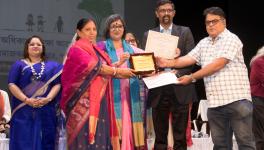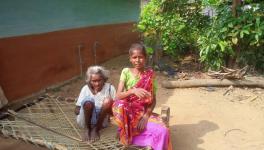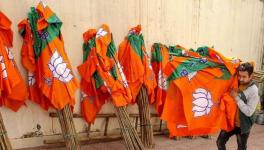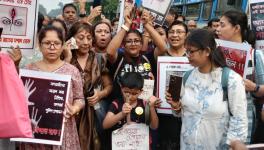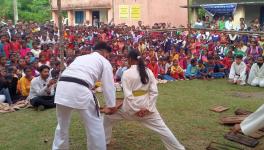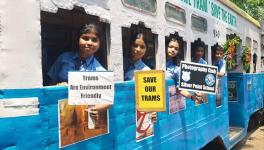In West Bengal, NRC Spells Hope for Opposition
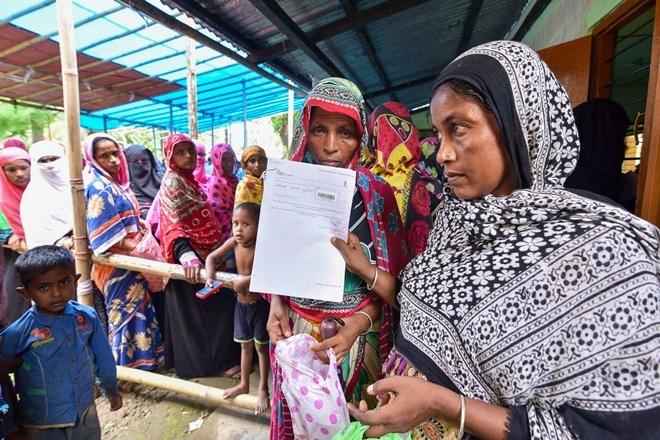
The National Register of Citizens (NRC) process in Assam has caused mild tremors in West Bengal’s Darjeeling hill region. The news has spread that roughly one lakh Gorkhas have been excluded from the Assam roster. This follows the news that among the roughly 19 lakh people excluded in the NRC’s final list of citizens, a large number have Bengali as their mother tongue.
Naturally, West Bengal Chief Minister Mamata Banerjee has called the NRC a “full fiasco”. She has announced she will lead a march on 12 September to register her party, Trinamool Congress' protest.
NRC is just one issue, among many others, that has forced the political parties in West Bengal to agitate just two weeks before Durga Puja. The Puja festivities usually kick-start a month of festivities and relative idleness.
The Left parties kicked off a protest on 2 September and their associates in the Socialist Unity Centre of India (Communist) and the CPIML-Liberation joined in. Their march decried the NRC and the Union government’s failure to solve pressing bread-and-butter issues.
A convention of Left intellectuals, including well known economists and artists, was held to urge the Centre to save and preserve the public sector as well.
The West Bengal Congress has lined up a public meeting on September 12 to highlight corruption in the state’s public distribution system, abnormally-high electricity tariffs and sharply-reduced interest rates on bank deposits.
Labour unions have announced a rally and convention on 20 September over shrinking job opportunities and the Centre’s policy of continuously de-emphasising the public sector’s role and hurried disruptions in labour laws without giving worker’s representatives any voice in the matter.
The Bharatiya Janata Party (BJP) has also firmed up its programmes for up to 20 September. It has an altogether different set of action points, starting with telling people in the state that the party has arrived on the scene. It is explaining its position on the abrogation of Jammu and Kashmir’s special status as an achievement of the prime minister, whose birthday it plans to celebrate on 17 September.
After the BJP bagged 18 seats in the Lok Sabha election, Mamata appeared crestfallen. Then, she engaged the election strategist and image make-over consultant Prashant Kishor.
Three months into Kishor’s work, some change is visible. Mamata is quieter and desists from commenting as often as she did before. She appears more sober and the stance of her party’s leaders is more clam too. There are still incidents of violence involving TMC and BJP workers, but fewer. Most importantly, the Opposition parties in Bengal are not facing hurdles from the TMC in conducting their political activities.
Mamata has launched a Jan Sanjog or public interaction programme, of which the Didi ke bolo or Tell Didi component has been talked about. In all, the chief minister seems to have retrieved some lost ground thanks to the ‘PK effect’ administered by Prashant Kishor.
Mamata’s limitations have surfaced too, in recent months. She is individually-oriented and woefully short of leaders who are readily acceptable to people. Then there is the persistent threat of defections from the TMC to other outfits, particularly the BJP.
Left parties are trying to organise themselves in Bengal through movements and agitations on key livelihood and related issues. The Communist Party of India (Marxist) or CPM has recovered a large number of party offices that had been forcibly occupied by TMC workers. More importantly, the frontal organisations of the CPM are drawing up action plans to highlight problems of the youth and farmers.
The Congress in West Bengal remains weak, though of late dissension has subsided and there is a realisation within the party that it can make its presence felt only through meetings, rallies and agitations amongst the public. Defections of legislators and other leaders to the TMC have trickled to a near end. The party is optimistic that Adhir Ranjan Choudhury’s being made Leader of Opposition in the Lok Sabha and Chairman of the Public Accounts Committee will improve its image.
The Left and Congress have reached an electoral understanding on the forthcoming by-elections for three Assembly seats. There is better floor coordination between them in the Assembly. The CPM and the Communist Party of India or CPI see the need for an electoral understanding too.
Swapan Banerjee, state secretary, CPI, acknowledges the growing influence of the BJP and holds Mamata’s wrong policies responsible, along with BJP’s use of money and muscle power. “The Left is trying to make people aware of the anti-people policies of the BJP-led Union government,” he says.
Similarly, the Forward Bloc is likely to fall in line during the Assembly bypolls. Naren Chatterjee, state secretary, Forward Bloc, says the TMC rule has deprived people of their democratic rights, which need restoration without delay. An electoral understanding with the Congress, Chatterjee feels, has to be developed through on-ground movements in order to be sustainable.
Yet, the Revolutionary Socialist Party or RSP has strong reservations about such a tie-up. Its stance is unlikely to soften. Manoj Bhattacharya, an RSP leader, says that Mamata disturbed the social fabric of West Bengal with her rabble-rousing and auotocrat-like rule. Yet, no electoral understanding with the Congress is possible unless the Congress first admits its mistakes. “The Congress was the fountainhead of malpractices that have left their undemocratic mark on our society,” Bhattacharya says.
Besides, from the RSP’s point of view, an alliance including the Congress is also hampered by the fact that it no longer enjoys people’s confidence. Bhattacharya also feels that the BJP’s membership campaign is a propaganda campaign that being propped up with plenty of media support.
The BJP is busy with a membership drive and its central leadership has already twice raised the target for its team in the state. They appear convinced that the party will emerge a force to reckon with in West Bengal. After the revocation of Article 370 from Kashmir, the BJP is also harping on Jana Sangh founder Syama Prasad Mukherjee’s claimed position on Kashmir. This, the BJP hopes, will help it forge a connection with the state’s voters.
Shamik Bhattacharya, core committee member of state BJP, is highly optimistic about the party’s prospects in the state. According to Bhattacharya people in the state had applied their mind seriously and would vote out the TMC ministry when opportunity came their way. How long would the chaotic situation continue, he asked. He did not accept the criticism that the membership drive was a publicity stunt and proper norms were not being followed.
“BJP’s membership drive smacks of a publicity stunt,” insists Swapnil Banerjee of the CPI. Anadi Sahu, a senior CPM member and state secretary of the Centre of Indian Trade Unions (CITU), says BJP leaders are asking people to sign membership forms on the ruse that it would entitle them to money under ‘Prime Minister’s schemes’.
It does appear as if the BJP overly optimistic, and not confronting its obvious limitations in West Bengal. The biggest problem before the party is that it does not have a face to project as chief minister. It is very dependent on Hindi-speaking north Indian leaders. The fallout of NRC, currently being felt in the Darjeeling hills, may also spread to other areas, in particular to the Muslim-majority districts of North Bengal.
Assamese and Bengali-speaking people have a history of friction (over language in particular), which makes the exclusion of Bengali-speaking people in the NRC an emotive issue. BJP leaders in Assam, particularly Himanta Biswa Sarma and the party’s central leaders, notably Home Minister Amit Shah, do not seem to be on the same page on this issue. Therefore, the NRC may play spoilsport for BJP in West Bengal.
Finally, it is Mamata’s failure to create job opportunities—a consequence of her failed industrial policy—coupled with the adverse effects of demonetisation and poor implementation of the new national tax regime (GST) that are key issues for the electorate. “Mamata pleads lack of funds for being unable to provide eggs to school children under the Mid-Day Meal Scheme but liberally gives funds for Puja celebrations to clubs and associations,” Sahu says.
Yet, seen from the point of view of Omprakash Mishra, a senior Congress leader, the situation in West Bengal is sharply polarised between the TMC and his own party. The Congress’s priority is to ensure that Opposition to the TMC does not end up strengthening the BJP. Downfall of Mamata’s government would aid the BJP, not the Congress. Therefore, he feels, the Congress needs to reassess the situation.
Get the latest reports & analysis with people's perspective on Protests, movements & deep analytical videos, discussions of the current affairs in your Telegram app. Subscribe to NewsClick's Telegram channel & get Real-Time updates on stories, as they get published on our website.










